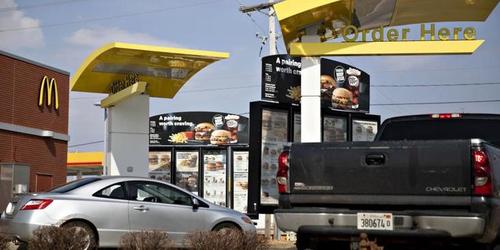McDonald’s Tests AI-Powered Automated Drive-Thrus At 10 Chicago Restaurants
As fast-food restaurants and small businesses struggle to find low-skilled workers to staff their kitchens and cash registers, America’s biggest fast-food franchise is seizing the opportunity to field test a concept it has been working toward for some time: 10 McDonald’s restaurants in Chicago are testing automated drive-thru ordering using new artificial intelligence software that converts voice orders for the computer.
McDonald’s CEO Chris Kempczinski said Wednesday during an appearance at Alliance Bernstein’s Strategic Decisions conference that the new voice-order technology is about 85% accurate and can take 80% of drive-thru orders. The company obtained the technology during its 2019 acquisition of Apprente.
Over the last decade, restaurants have been leaning more into technology to improve the customer experience and help save on labor. In 2019, under former CEO Steve Easterbrook, McDonald’s went on a spending spree, snapping up restaurant tech. Now, it’s commonplace to see order kiosks in most McDonald’s locations. The company has also embraced Uber Eats for delivery. Elsewhere, burger-flipping robots have been introduced that can be successfully operated for just $3/hour (though “Flippy” had a minor setback after its first day in use).
The concept of automation is currently being used, in some places, as a gimmick. And with the dangers that COVID-19 can pose to staff (who can then turn around and sue), we suspect more “fully automated” bars will pop up across the US.
One upscale bistro in Portland has even employed Robo-waiters to help with contactless ordering and food delivery.
The introduction of automation and artificial intelligence into the industry will eventually result in entire restaurants controlled without humans – that could happen as early as the end of this decade. As for McDonald’s, Kempczinski said the technology will likely take more than one or two years to implement.
“Now there’s a big leap from going to 10 restaurants in Chicago to 14,000 restaurants across the US, with an infinite number of promo permutations, menu permutations, dialect permutations, weather — and on and on and on,” he said.
McDonald’s is also exploring automation of its kitchens, but that technology likely won’t be ready for another five years or so – even though it’s capable of being introduced soooner.
McDonald’s has also been looking into automating more of the kitchen, such as its fryers and grills, Kempczinski said. He added, however, that that technology likely won’t roll out within the next five years, even though it’s possible now.
“The level of investment that would be required, the cost of investment, we’re nowhere near to what the breakeven would need to be from the labor cost standpoint to make that a good business decision for franchisees to do,” Kempczinski said.
And because restaurant technology is moving so fast, Kempczinski said, McDonald’s won’t always be able to drive innovation itself or even keep up. The company’s current strategy is to wait until there are opportunities that specifically work for it.
“If we do acquisitions, it will be for a short period of time, bring it in house, jumpstart it, turbo it and then spin it back out and find a partner that will work and scale it for us,” he said.
On Friday, Americans will receive their first broad-based update on non-farm employment in the US since last month’s report, which missed expectations by a wide margin, sparking discussion about whether all these “enhanced” monetary benefits from federal stimulus programs have kept workers from returning to the labor market.
Tyler Durden
Fri, 06/04/2021 – 22:00
via ZeroHedge News https://ift.tt/3x3qeFT Tyler Durden
